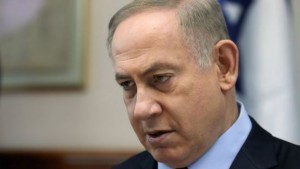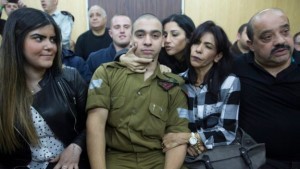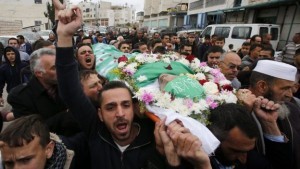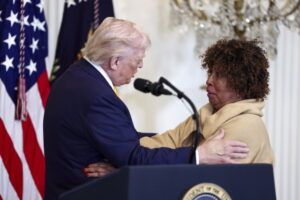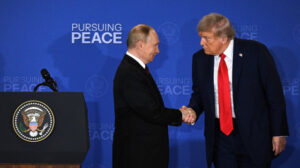Israel’s Prime Minister Benjamin Netanyahu has called for a pardon for a soldier convicted of manslaughter for killing a wounded Palestinian.
Elor Azaria, 19 at the time, shot Abdul Fatah al-Sharif, 21, in the head while he was lying immobile on a road.
A military court convicted the soldier after dismissing his assertion that the Palestinian still posed a danger.
The case has divided Israeli opinion. Azaria, a sergeant, will be sentenced next Sunday, Israel’s military says.
There have been rallies to support the soldier, but top military figures say his actions do not reflect the values of the Israel Defence Forces (IDF).
Mr Netanyahu issued his call on Facebook, writing: “I support giving Elor Azaria a pardon.”
“This is a difficult and painful day for all of us – and first and foremost for Elor and his family, soldiers and for the parents of our soldiers, and me among them.”
In March, the prime minister called Azaria’s family to express sympathy for their predicament.
He joins some other members of the governing coalition in calling for a pardon, including right-wing Education Minister Naftali Bennett.
But centre-left politician and former Foreign Minister Tzipi Livni said the verdict should be accepted.
“Only that way can we stop the bleeding within Israeli society since the event occurred and reunite around the military and Israel as a state of laws, whose army is outside political discourse.”
President Reuven Rivlin said he could only deal with the issue of a pardon once the judicial process had run its course.
‘No immediate threat’
The incident took place in Hebron in the occupied West Bank on 24 March.
Sharif and another 21-year-old Palestinian, Ramzi Aziz al-Qasrawi, stabbed and wounded an Israeli soldier before troops opened fire on them, wounding Sharif and killing Qasrawi.
Footage of the scene several minutes later, filmed by a Palestinian and released by the Israeli human rights group B’Tselem, shows Sharif alive, wounded and now unarmed.
A soldier, identified as Azaria, is then seen cocking his rifle and fatally shooting Sharif in the head from several metres away.
Israel-Palestinians: Blame and bitterness keeping peace at bay
In their indictment, prosecutors said Azaria “violated the rules of engagement without operational justification as the terrorist was lying on the ground wounded and represented no immediate threat for the accused or others who were present”.
Delivering the verdict on Wednesday, the panel of three military judges rejected Azaria’s defence that he shot Sharif because he continued to pose a threat.
He had told the court that he believed there might be a suicide belt under the Palestinian’s jacket.
The judges, who took two-and-a-half hours to deliver their verdict, noted that Azaria’s commanders had testified that he did not mention the same concerns when they questioned him immediately after the shooting incident.
The judges also cited another soldier, who told military investigators that Azaria had said during the incident: “They stabbed my friend and tried to kill him – he deserves to die.”
Azaria told the court that he did not recall having any such conversation, but the head of the judging panel, Col Maya Heller, described him as an “unreliable witness”.
“His motive for shooting was that he felt the terrorist deserved to die,” she said.
Mother’s anger
A spokesman for Azaria’s family said evidence proving his innocence had been ignored. “It was like the court was detached from the fact that this was the area of an attack,” he said.
The soldier’s mother, Oshra, shouted at the judges: “You should be ashamed of yourselves.”
The defence team has said it will appeal against the verdict. Manslaughter in Israel carries a maximum 20-year term.
Sharif’s father Yusri said Azaria deserved a life sentence. Sharif’s uncle, Fathi, told Haaretz that the decision to try him for manslaughter rather than murder was “a perversion of justice and of the court”.
Defence Minister Avigdor Lieberman, who expressed support for Azaria before taking office in May, said the verdict was “difficult” and that the defence establishment would “do everything it can to assist the soldier and his family”.
But he also called on the public to respect the court’s decision.
Sari Bashi, Israel advocacy director at Human Rights Watch, described the verdict as “a positive step toward reining in excessive use of force by Israeli soldiers against Palestinians”.
The shooting happened during a wave of knife, gun and vehicle ramming attacks by Palestinians or Israeli Arabs in Israel and the West Bank that has killed at least 42 people since September 2015, according to the Israeli authorities.
Human Rights Watch said on Monday that video footage or witness accounts raised serious questions about many of the more than 150 instances in which Israeli forces have fatally shot Palestinians during attacks or attempted attacks on Israelis.
Ask me anything
Explore related questions
